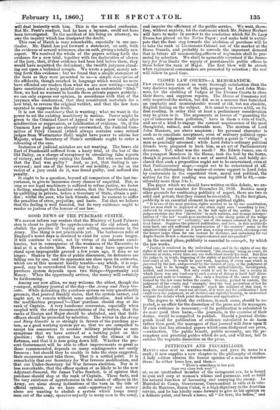GOOD NEWS OF THE PURCHASE SYSTEM.
WE cannot inform our readers that the Ministry of Lord Palmer- ston is about to justify, the apprehensions of the old school, and abolish the practice of buying and selling commissions in the Army. The thing is not practicable yet. The barbarous relic of England's worst days is destined to exist for some years longer. It will continue to exist, not by virtue of its inherent excel- lencies, but in consequence of the weakness of the Executive to deal at it a decisive blow. However it may have appeared to stand upon impregnable ground a few years ago, it does so no longer. Shaken by the fire of public discussion, its defenders are falling one by one, and its opponents are close upon its outworks, which are at this moment hardly tenable—nay which, it is sup- posed, may be surrendered from day to day. The future of the purchase system depends upon two things—Opportunity and Money. When the opportunity arrives, the money will certainly be forthcoming. WE cannot inform our readers that the Ministry of Lord Palmer- ston is about to justify, the apprehensions of the old school, and abolish the practice of buying and selling commissions in the Army. The thing is not practicable yet. The barbarous relic of England's worst days is destined to exist for some years longer. It will continue to exist, not by virtue of its inherent excel- lencies, but in consequence of the weakness of the Executive to deal at it a decisive blow. However it may have appeared to stand upon impregnable ground a few years ago, it does so no longer. Shaken by the fire of public discussion, its defenders are falling one by one, and its opponents are close upon its outworks, which are at this moment hardly tenable—nay which, it is sup- posed, may be surrendered from day to day. The future of the purchase system depends upon two things—Opportunity and Money. When the opportunity arrives, the money will certainly be forthcoming.
Among our new allies, we may welcome the ablest, though the youngest, military journal of the day—the Army and Navy Ga- zette. While defending the purchase system on very questionable grounds, that journal frankly states, that the system cannot, and ought not, to remain without some modification. And what is the modification proposed?—That' purchase should stop at the rank of Captain. A very handsome concession, especially when coupled with the other recommendations of the writer, that the ranks of Ensign and Major should be abolished, and that field- officers should be promoted by selection. The writer in the Army and Navy Gazette is so strongly in favour of the purchase sys- tem, as a good working system per se, that we are compelled to accept his concessions to sounder military principles as sure symptoms that we have arrived at a turning point on this question ; that the system has reached the climax of its fortunes, and that it is now going down hill. Whether the pre- sent Government will be able to effect improvements so great as those recommended, depends on many contingencies not 'easily foreseen ; but should they be unable to take the steps suggested, their successors must take them. That is a settled point. It is remarkable that our Secretary for War favours modification, and that our Under-Secretary for War favours abolition. Nor is it less remarkable, that the officer spoken of as likely to be the new Adjutant-General, Sir James Yorke Scarlett, is of opinion that purchase should atop at the rank of Captain. These facts, and the very existence of apprehension in the minds of officers in the Army, are alone strong indications of the turn in the tide of official opinion. As we have said—opportunity and money alone are wanting to abolish a system which keeps many men out of the army, operates unjustly to many men in the army,
and impairs the efficiency of the public service. We wait, there- fore, without anxiety, for the statement which Mr. Sidney Herbert will have to make in answer to the resolution which Sir De Lacy Evans has placed on the Notice Paper ; and make bold to antici- pate that the first step towards the abolition of purchase will be to take the rank of Lieutenant-Colonel out of the market at the Horse Guards, and probably to concede the important demand that in future all coramanding.officers of regiments shall be pro- moted by selection. We shall be agreeably surprised if the Secre- tary for War limits the supply of purchaseable public offices to those below the rank of Major. The first blow will be struck when regimental commanders are promoted by selection; the rest will follow in good time.






























 Previous page
Previous page